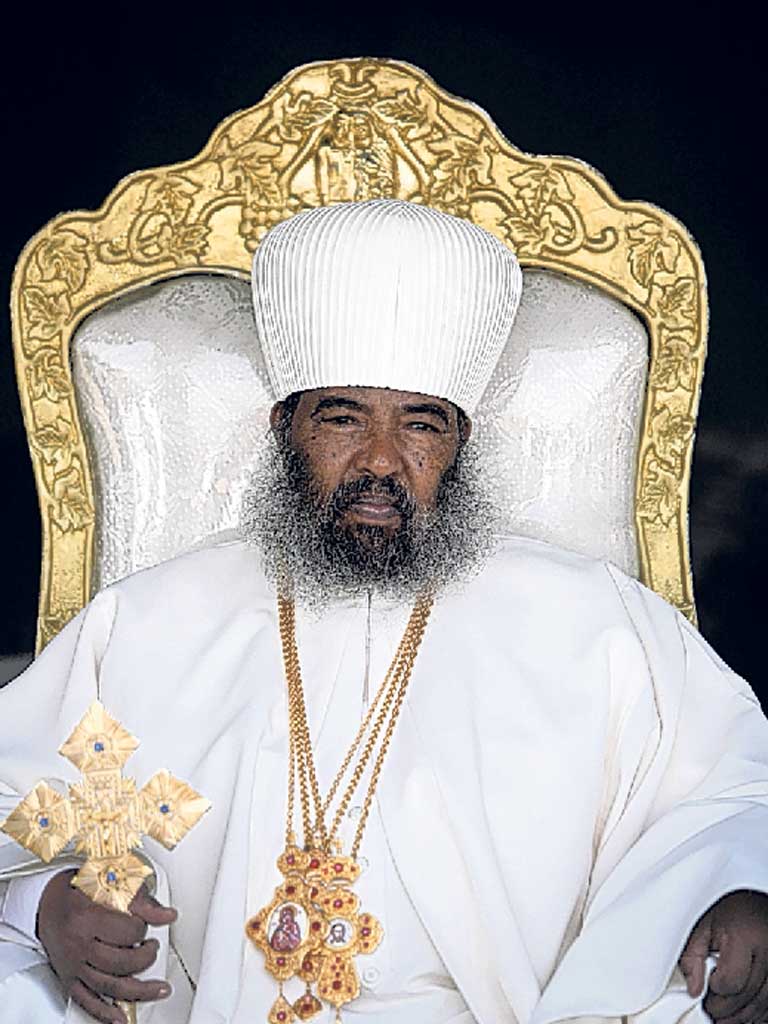Abune Paulos: Religious leader and peace activist

Abune Paulos led the Ethiopian Orthodox Tewahedo Church, which has more than 40 million members, as well as serving on the Central Committee of the World Council of Churches and its Commission on Faith and Order. He was one of seven serving presidents of the WCC. While he was instrumental in interfaith dialogue initiatives, Abune Paulos was vocal in several international platforms, including the World Economic Forum and the World Summit of Religious and Spiritual Leaders at the United Nations.
Patriarch Dr Abune Paulos was born Gebre Medhin Wolde Yohannes in the northern market town of Adwa in Tigray Province, Ethiopia in 1935. Inevitably, he was influenced by the town's association with the decisive Battle of Adowa, fought in 1896 against Italian troops. Ethiopian soldiers won the battle, making their country the only African nation to thwart European colonialism. However, his birth coincided with the Italian invasion of 1935 and he grew up under the shadow of the Fascist occupation. His family was long associated with the Abba Garima Monastery near the town, and when he was a young boy he entered the monastery as a deacon trainee, eventually taking monastic orders and being ordained a priest.
Known as Abba Gebre Medhin, he continued his education at the Theological College of the Holy Trinity in Addis Ababa under the patronage of Patriarch Abune Tewophilos. In the United States he studied at the St Vladimir's Orthodox Theological Seminary, New York, and afterwards joined the doctoral programme at the Princeton Theological Seminary.
In 1974, Paulos was by summoned by Patriarch Abune Tewophilos to return to Addis Ababa shortly after the coup that toppled Haile Selassie. The Derg, a committee of junior military officers and enlisted men, had taken advantage of the government's disarray to depose the Emperor on 12 September.
Paulos was anointed bishop, assuming the name and style of "Abune", the honorific title used for a bishop of the Ethiopian Orthodox Church, and given responsibility for ecumenical affairs by the Patriarch. But because the Patriarch had named Paulos and four other new bishops without the permission of the Derg communist junta, all five men were arrested, and the Patriarch was eventually executed. Abune Paulos and his fellow bishops were imprisoned until 1983. He returned to Princeton in 1984 to complete his doctoral degree, and was elevated to the rank of Archbishop by Patriarch Abune Takla Haymanot in 1986 while still in exile.
The Soviet-backed regime led by Mengistu Halle Mariam fell in 1991, and a year later the then Patriarch of the Ethiopian Orthodox Church, Abuna Merkorios, was dethroned in circumstances that remain under dispute; his supporters claimed that he was deposed by the new revolutionary coalition government of the Federal Democratic Republic of Ethiopia and its supporters, while his opponents maintained that the Patriarch abdicated following numerous protests against him by the faithful. His attempt to reverse this was refused by the Holy Synod of the Church, which authorised a new Patriarchal election. Abune Paulos was elected in 1992, and Abune Merkorios and his supporters went into exile, establishing a rival synod in the US. The enthronement of Abune Paulos as Patriarch is recognised by all the canonical Orthodox Christian Churches.
Among Paulos's achievements was the initiative which led to the series of peace meetings between Ethiopian and Eritrean religious leaders between 1998 and 2000, an attempt to bring peace to the two countries in response to their long and bitter long border war. Patriarch Paulos and the Orthodox Church were extensively involved in the support of war-displaced and drought-hit Ethiopians, making the Church one of the major relief organisations in the country.
Abune Paulos served as an Honorary President of Religions for Peace, the world's largest and most representative multi-religious coalition, advancing common action among the world's religious communities. The WCC General Secretary, the Rev Dr Olav Fykse Tveit, commented, "His role in promoting interfaith dialogue in Ethiopia and beyond is a continuing legacy for the churches. He highlighted the concerns of women and youth, especially in regard to HIV and Aids."
The Archbishop of Canterbury, Rowan Williams, also paid tribute, saying, "He played a unique role in reviving and strengthening his church after a period of prolonged crisis and much suffering. The Ethiopian Church is now seen as a major presence in international Christianity, rising to the new challenges of modern Africa.'
Gebre Medhin Wolde Yohannes (Patriarch Dr Abune Paulos), religious leader: born Adwa, Tigray, Ethiopia 3 November 1935; died Addis Ababa 16 August 2012.
Join our commenting forum
Join thought-provoking conversations, follow other Independent readers and see their replies
Comments
Bookmark popover
Removed from bookmarks